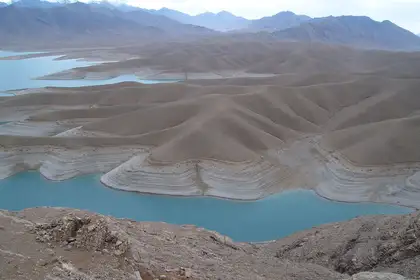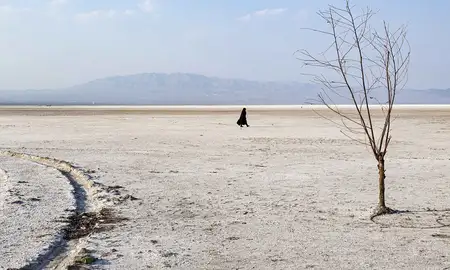
Mountains and river in Helmand Province of Afghanistan. Photo: U.S. Military.
The evolving discord between Iran and Afghanistan over the Helmand River signifies an escalating geopolitical predicament with looming possibilities of a conflict.
The basis of the dispute can be traced back to the initiation of the Kamal Khan Dam in Afghanistan in March 2021. In his inauguration speech, the then-Afghan President Ashraf Ghani announced that Afghanistan would stop providing 'free' water, subtly hinting that Iran should counter this move by supplying fuel to Afghanistan in exchange for water.
This statement stirred a historical argument over water distribution, an issue that has seen heightened intensity since the Taliban's most recent ascension to power in Afghanistan.
The Helmand River is a significant water source in Asia. It originates in the Hindu Kush mountains of central Afghanistan and flows through Afghanistan and Iran for approximately 1,150 kilometres.
The basin of the river is in South-Western Afghanistan and South-Eastern Iran. In Afghanistan the river’s basin covers parts of Nimruz, Helmand and Kandahar provinces and in Iran it covers the Sistan and Baluchistan provinces.
This transboundary river is the home of diverse wetlands and marshes that are the habitats of migratory birds. It also includes the Hamun-e-Helmand wetland system in Iran, which is home to many bird species in their annual migrations.
The river’s basin in Afghanistan and Iran includes distinct flora, from riparian forests to desert and wetland vegetation. The river is vital for irrigation and agriculture in Afghanistan and Iran and is the backbone of the local economy in both countries.
The river is also the main source of electricity through hydropower plants for Afghanistan and it’s this function of the river that has increased the demand for dams in the country.
Until the recent tension, Iran and Afghanistan remained relatively committed to the treaty they signed in 1973 over Helmand River waters. The treaty regulates the allocation and management of water resources from the river, addressing disputes over water rights and the use of the river.

Dr Negar Partow of Massey University (left) and Rana Dadpour of James Cook University.
The key aspects of the 1973 treaty are the specific water rights and irrigation quotas that have been allocated to each country, as well as the mechanisms they can use for monitoring water flows and sharing hydrological data.
The treaty recognises the social and economic development dependencies of the river in Afghanistan and Iran and emphasises an equitable and reasonable use of the river.
Interestingly, one of the main factors of the treaty is its focus on cooperation and joint management of the river and its related issues. To achieve this goal, the treaty advocates for the formation of a Joint Technical Committee that would address any dispute and promote shared management of the river.
While these factors exist and are emphasised in the treaty, issues such as political instability, war, regime changes and other political and economic obstacles have prevented the establishment of the committee or the enforcement of the provisions of the treaty.
Nonetheless, the Helmand River Treaty of 1973 mandates that Afghanistan must ensure a specified rate of water flow from the Helmand River into Iran. According to the treaty, Afghanistan is to supply Iran with 850 million cubic meters of water annually from the Helmand River.
However, the treaty concurrently grants Afghanistan exclusive rights over the residual water, thereby enabling it to undertake development projects such as agriculture, hydroelectricity and reservoirs at its discretion. Despite these unambiguous conditions, Iran has consistently voiced apprehensions regarding the dam's implications on its water resources, increasing the tension between the two countries.
Since 2001 and the takeover of Afghanistan by United States forces and their allies, multiple dams have been built over the Helmand River. Despite massive investment from the British in the Operation Tethys initiative in 2011, the study of Helmand River’s basin and hope for revitalising this has had no positive result. As the security situation worsened in Afghanistan, foreign forces lost interest in development projects and instead focused on a way out of the county.
In Afghanistan, the Taliban seized power in August 2021. Since then, they have been confronted with serious charges of gender apartheid, gradual genocide of the Hazara community, large-scale corruption and inefficiency in managing the country’s everyday affairs. The rampant food security issues, poverty, lack of transparency and accountability of the government has left the Taliban struggling to remain in power. As a result, politics in Afghanistan has been reduced to violence, attacks, arrests of journalists and the brutal suppression of women.
The regime in Iran also grapples with its own problems. As of 2022, the regime in Iran has been tirelessly trying to silence the “woman, life, freedom” revolution in vain.
The widespread anti-regime demonstrations have further challenged the Islamic Republic’s legitimacy. The regime has found itself increasingly isolated, with its economy on precarious footing. This milieu of internal instability could potentially amplify the water dispute and its prospective repercussions. By diverting public attention to the water problem and a potential war with the Taliban, the Islamic Republic hopes to buy some legitimacy for the regime.
The tension between Iran and Afghanistan was exacerbated in 2022 when the Taliban refused to allow Iran’s share of water to flow in the country. In July 2022, Iran's Foreign Minister Hossein Amir Abdollahian issued a cautionary statement to his Afghan counterpart, underscoring the strained bilateral relations that the water issue could cause. While the river already had been damaged by the use and construction of multiple dams, over a very short period diverse animal species and vegetation began to suffer further as the wetlands began to dry out and the economic situation of the local people in the area worsened.
In May 2023, Iran’s President Ibrahim Raeisi warned the Taliban about Iran’s rights regarding the river. In response, the Taliban set up a military parade with the American tanks they now own, announcing that they would march to Tehran to 'disciple the Islamic Republic'. This has exacerbated the tension between the two countries in border areas, which resulted in the killing of two Iranian border guards and a Taliban member on 27 May 2023.
Given the escalating conflict around the Helmand River and its potential threats to regional equilibrium, a compelling argument for return to the 1973 treaty is crystallising.
With both nations entangled in internal legitimacy crises and high stakes at play, it is imperative for both countries’ civil society to play a mediating role in the water dispute to prevent its escalation into an open confrontation.
Possible interventions could begin by fostering cooperative water management practices and facilitating dialogue and mutual understanding between local bodies. Intervention could also be in the form of demands from Iranian and Afghan civil society groups to communicate with United Nations Water for a mediatory solution.
The dispute between Iran and Afghanistan is an example of the growing tension between states over water. It is essential for the United Nations to undertake a leadership role in dealing with such disputes in a systematic manner. Otherwise, the Middle East region will see new deadly conflicts over breaking old water treaties that are now difficult to maintain as the result of environmental degradation.
Related news

Opinion: The momentous United Nations Security Council meeting on Iran
Senior Lecturer Dr Negar Partow from Massey's Centre for Defence and Security Studies writes about the recent UN meeting that addressed the actions of the Islamic Republic.

Opinion: With an Iranian Feminist Revolution on the rise, the future of political Islamism is determined
Senior Lecturer Dr Negar Partow from Massey's Centre for Defence and Security Studies offers insights into the women's movement in Iran.
